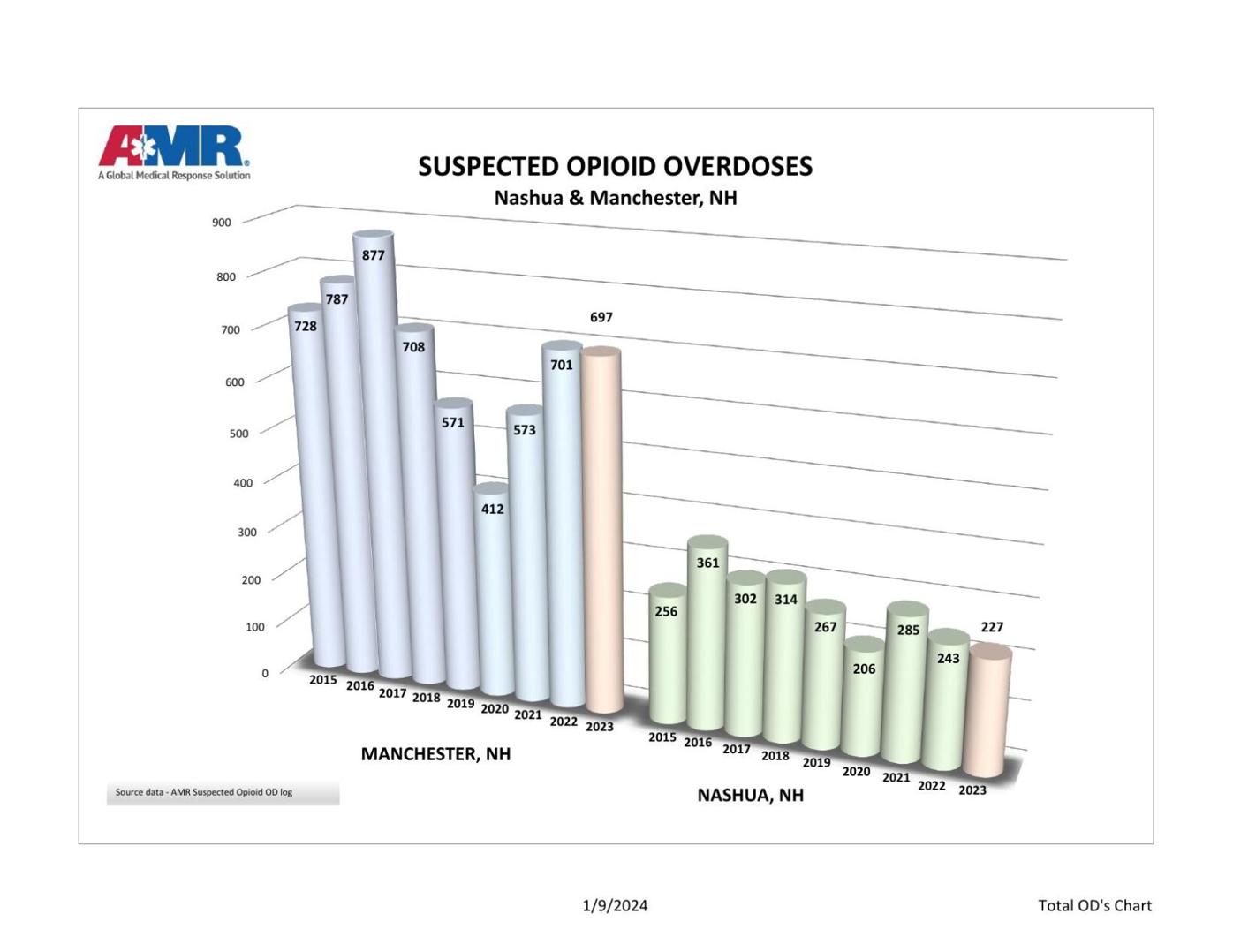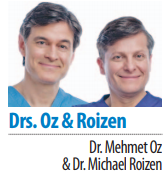OPIOID EPIDEMIC
Fatal ODs declined in Nashua, Manchester in 2023 • A3
------------------
The number of fatal overdoses in the state’s two largest cities dropped 20% last year compared with 2022, American Medical Response (AMR) medics reported Wednesday.
AMR medics responded to a total of 924 suspected opioid overdoses in Nashua and Manchester in 2023 — 697 in the Queen City and 227 in the Gate City. That’s a 2% reduction, down from 944 in 2022, according to Chris Stawasz, regional director for AMR.
Ninety-nine of those calls involved fatal overdoses, 60 in Manchester and 39 in Nashua, a 20% drop (down from 123) in 2022.
Looking at city-specific numbers, in Manchester the number of suspected opioid overdoses year over year was down 1% (697 compared with 701 in 2022), while fatal overdoses were 24% lower (60 versus 79). Eight percent of all suspected opioid overdoses in Manchester last year were fatal, according to AMR.
In Nashua, the overall number of overdoses were down 7%, 227 in 2023 versus 243 in 2022, with fatal overdoses down 11% (39, down from 44). Seventeen percent of all suspected opioid overdoses in Nashua resulted in fatalities.
“Opioid related fatalities dropped significantly in Manchester last year, which is highly encouraging,” Stawasz said in an email. “After two years of significant increases in the number of suspected opioid overdoses in Manchester, the 2023 number was essentially unchanged from the previous year. Suspected opioid overdoses continued to drop for the second year in a row in Nashua, and this past year suspected deaths dropped as well.”
The percentage of fatal overdoses compared with overall overdoses in Nashua last year continued to be almost double that of Manchester, Stawasz said.
There were spikes in overdoses in both cities over the course of the year. Of the 104 suspected opioid overdoses reported in October, 76 were in Manchester — the highest one-month total for the Queen City since August 2018. The other 28 were in Nashua, the highest one-month total for the Gate City since May 2022.
Manchester health officials credit the 24% overall reduction in suspected overdose fatalities year over year to the work of the Rapid Overdose Assessment and Response Team, along with the Crisis Response Unit.
Both programs were launched with the guidance of the Centers for Disease Control and Prevention (CDC) as well as the National Association of City and County Health Officials (NACCHO).
“While we are pleased with this initial year of work, there is still much to do,” Manchester Health Director Anna Thomas said in a statement. “Knowing that many individuals who are struggling with addiction are not from Manchester is concerning and calls for a comprehensive and coordinated statewide strategy to prevent overdoses — especially among the unhoused.”
Manchester was selected as one of 20 communities nationally to bolster overdose prevention strategies on the local level, Thomas said. With the assistance of CDC and NACCHO funding her department, she hired a director of overdose prevention and 12 overdose prevention outreach workers who respond when an overdose fatality spike is detected or when a community lacks enhanced outreach support.
The Rapid Overdose Assessment and Response Team is made up of multidisciplinary professionals with experience and training in harm reduction and fatality prevention services, evidence-based treatment, and recovery support service options in the community.
Team members work in tandem with the existing Crisis Response Unit, a partnership between Manchester police and the city health department’s Public Health and Safety Team, to follow up on individuals who have overdosed within 24 to 48 hours.
“These combined efforts exemplify ‘meeting people where they are at,’ and demonstrate a deep compassion for those who are struggling with substance use disorders by our first responders and outreach workers” Manchester Mayor Jay Ruais said in a statement. “Every life lost is a tragedy with incalculable costs, and every life saved in Manchester improves the quality of life throughout our community. It also prevents unnecessary costs, stress and fatigue of our first responders, caregivers and family members, redirecting those resources to where they are needed most.
“While more work remains, I am encouraged by this report, and thank all those involved in our city’s response.”
According to AMR, of the 924 suspected opioid overdoses reported last year in both Manchester and Nashua, 38% occurred in a home or residence, 25% happened in a public building or area and 24% were in vehicles or in a roadway.
Three percent occurred in a jail or prison. Three percent took place in a hotel or motel.
In 31% of the overdoses, a bystander or member of the public administered Narcan before EMS personnel arrived.
Overall, 42% of those involved in suspected opioid overdoses gave no fixed address or said they were homeless; 36% gave a home address in Manchester, 16% and said Nashua.
Of the 924 suspected overdoses in both cities, 69% involved males, 31% females. The majority of overdose victims, 68%, were Caucasian.
Fifty-two percent of overdose response calls involved a first encounter with an individual; 47% involved repeat encounters.
In New Hampshire, anyone can seek substance use disorder treatment by accessing the NH Doorway program 24/7. To access the NH Doorway program, call 211 at any time of the day or night, or visit www.thedoorway.nh.gov.
If you believe someone is overdosing, call 911 immediately.







